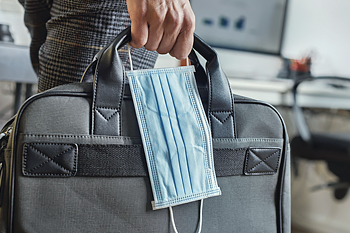Employment trends expert weighs in
 A new poll has revealed that President Trump’s COVID-19 diagnosis has led to an increase in mask-wearing, with 25% more Americans opting for face coverings after learning of his diagnosis. Still, mask-wearing is a hotly debated topic even at the White House, with many critics condemning the fact that President Trump removed his mask in public even after his diagnosis, while others say mask-wearing policies are becoming too stringent.
A new poll has revealed that President Trump’s COVID-19 diagnosis has led to an increase in mask-wearing, with 25% more Americans opting for face coverings after learning of his diagnosis. Still, mask-wearing is a hotly debated topic even at the White House, with many critics condemning the fact that President Trump removed his mask in public even after his diagnosis, while others say mask-wearing policies are becoming too stringent.
“Right now, what’s happening at the White House is a microcosm of what’s happening in workplaces across the country,” says Rob Wilson, employment trends expert and President of Employco USA, a national employment solutions firm with locations across the country. “Masks have become heavily politicized and policed, and as COVID-19 cases continue to spike, these conversations about mask-wearing and proper mask etiquette are happening more and more. These conversations can become very difficult in the workplace where HIPAA policies and employee’s rights might feel at odds with mask regulations.”
Wilson says that many employers are grappling with how to enforce mask-usage without stepping over the line, and the employment trends expert explains that this is a topic he has helped many of his clients navigate.
“This is brand-new territory for employers and H.R. departments. And supervisors are really struggling with how to appropriately navigate mask-wearing conversations with employees,” he says. “People can have everything from medical to religious excuses for not wanting to wear a mask, but at what point do these exemptions become unsustainable when it comes to the safety of your staff and customers?”
Wilson says employers can save themselves future headaches by taking a strong, clear stance about mask usage that allows for little wiggle room.
“You can require mask usage from your employees and customers, and post signs to the effect. Having a meeting about COVID-19 procedures in which you discuss masks and perhaps hand out PPE to your staff is another good idea,” says Wilson. “But if an employee tells you they can’t wear a mask because they have a medical condition, you need to tread lightly.”
Wilson says you should ask employees who cannot wear masks for personal reasons to provide a note from their doctor excusing them from wearing a face-covering.
“You can’t ask for the exact reason or you will be violating HIPAA,” says Wilson. “But if an employee wants to opt-out of wearing a mask, they need to be able to back that up with a medical statement from their healthcare provider so you know the reason is legitimate.”
Wilson says employees who can’t wear masks should be isolated from other employees. “Use Plexiglass or similar material to create a partition around their cubicles, which is a wonderful idea even for those employees who do wear masks. While you can’t refuse to allow your employees to work for this reason (as this inability to wear a mask could be part of a disability), you can separate them as much as possible from the rest of the staff, and ask them to keep at least 6-feet of distance from coworkers at all times. Have them use a separate, single-stall bathroom and a different entrance and exit from the building if possible.”
Wilson also says that using air purifiers in common areas like the break room can help employees feel safer.
“No doubt some employees will come to you with complaints if they see a coworker not wearing a mask or wearing a mask incorrectly, such as not covering their nose fully,” says Wilson. “Respond to this by having regular communication with your staff regarding mask protocols, either over email or at office-wide meetings. Hang signs to remind your staff to wear masks along with images that depict the correct way to wear them. Carve more breaks into your employees’ schedules so that they can step outside for coffee breaks rather than having to take their masks off to drink their coffee at their desk. And catch them wearing their masks right – in other words, commend employees who you see being rigorous about mask-wearing and applaud their efforts openly.”
For more on this topic, please contact Rob Wilson at rwilson@thewilsoncompanies.com.